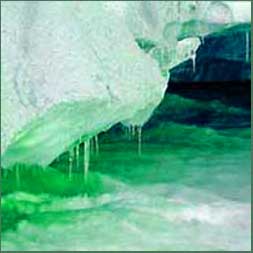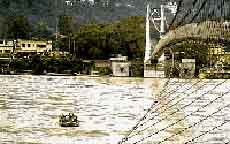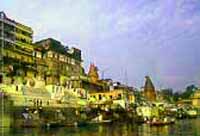| Environment Bridge to Heaven
|
|||||
|
More on Uttarakhand • An Overview
Environment
Adventure activities | ||||
She dances and swirls around the rocks in Gaumukh. She harbours a host of aquatic species in her abdomen. One-tenth of earth's humanity thrives on her abundant waters and fertile banks. She meanders through the vast expanses of the Northern Fertile Plain for a tremendous 1,560 miles to meet her sister, Brahmaputra.
And she mingles herself in the bay, spreading out to form the world's largest delta, supporting some of the rarest flora and fauna on the face of the earth. All this she does, not before washing away the sins of millions of Hindus over time immemorial.
At Hrishikesh, she is bewildered, at the first attempt at molestation. The pharmaceutical units discharge toxic effluents laden with Hydrochloric acid, acetone and other chemical solvents. She watches the smaller fish die in agony. She watches the weeds suck out oxygen from her well-aerated waters. But she does not complain! Meet her at Haridwar and you will find an adolescent, grown more... become more modest. Seeing hundreds of people throng her banks, worship her and offer prayers to her in knee-deep water, gilded by the morning sun, she becomes more lady-like, like a girl in her teens, more dignified when she comes to know of her charms, expressed in the adulation of her wooers. People worship her... call her mother. Proud of her new-found motherhood, Ganga, already an adult, reaches the city of Kanpur. The Hindus of Kanpur adore her, sprinkle flowers on her ghats, build huge temples on her consecrated soils and as she moves along deeply engrossed, hundreds of tanneries pump thousands of tons of sludge and liquid residue containing heavy doses of toxic lead, cadmium and chromium compounds. She is pained to see the lethal chemicals sink into her and penetrate her clarity with a diffused brown-black. For hundreds of animals in her womb, it is death... total death! She watches their limp, lifeless bodies float to the surface only to be pecked away by hungry water birds. Her harmony is broken! Her peace is shattered!
By the time she lands up in Calcutta, she has nothing to hope for... nobody to tell her that things could improve... nobody to take time out of their development schedule for her woeful state. All she waits for is her final union with the Bay of Bengal. After having suffered so much, for the past so many decades, the power to suffer has, to a large extent, left her. Every monsoon, she frets and fumes on her heavily silted beds, and throws out walls of water to inundate man and his development pursuits. In so doing, she registers a formal complaint against her heartless defilement at the hands of the cruel beasts who call her their mother. Some of these complaints landed on more receptive ears and the massive Rs. 1,700 crore Ganga Action Plan was launched in 1985 to clean up the Ganga and to restore her suffocated waters to its original re-aeration capacity which was twenty times that of other rivers. Phase One is already over, achieving less than twenty percent of its target. Phase Two has also been launched, filling the pockets of unscrupulous politicians and bureaucrats. Courts continue to give stay orders. Turtles continue to be released in the Ganga to feed on decaying corpses and, actually, get fed on by poachers. Environmental activists and NGO's continue to cry themselves hoarse while the weak legislation against pollution cocks a deaf ear. Washerwomen, in colourful saris, continue to beat clothes on stone edges on her banks. The urchin continues to wash his dog, a couple of feet from where a mother gives her infant child a holy dip of skin diseases. How about doing our bit? Stop calling her mother! Stop worshipping her by floating earthen lamps, fuelled by viscous oil, on her surface to choke the air out of her lungs! Stop consigning scores of our deity idols into her heavily silted bed! Stop treating her as though she were exalted- a bridge across to heaven! And, for a change, use incinerators for our deceased relatives!
|
|||||
Editor: Romola Butalia (c) India Travelogue. All rights reserved. |
|||||
 From the icy glacial deposits of Gangotri to the swelling waters of the Bay Of Bengal, from the pharmaceutical industries of Hrishikesh to the giant port of Hooghly, from the sedimentary rocks of the Himalayan terrain to the fertile alluvium of the food bowl of India, and from the lofty, coniferous deodars of the Shivaliks to the thick, lush mangroves of Sundarbans, no other river has influenced Indian lifestyle more than the Ganga - the bridge across to heaven!
From the icy glacial deposits of Gangotri to the swelling waters of the Bay Of Bengal, from the pharmaceutical industries of Hrishikesh to the giant port of Hooghly, from the sedimentary rocks of the Himalayan terrain to the fertile alluvium of the food bowl of India, and from the lofty, coniferous deodars of the Shivaliks to the thick, lush mangroves of Sundarbans, no other river has influenced Indian lifestyle more than the Ganga - the bridge across to heaven!
 She is a playful child, leaping about in naughty pranks in the upper Himalayas. She bobs rafts on her sparkling waters, winking at you through the bright, twinkling stars which the sun ties on her apron. She throws you up, she lurches you down and when you get splashed all over, she laughs heartily in her musical ripples. You will be amazed at her energy and her childlike enthusiasm. Measuring hardly a couple of feet across, she is young and vigorous.
She is a playful child, leaping about in naughty pranks in the upper Himalayas. She bobs rafts on her sparkling waters, winking at you through the bright, twinkling stars which the sun ties on her apron. She throws you up, she lurches you down and when you get splashed all over, she laughs heartily in her musical ripples. You will be amazed at her energy and her childlike enthusiasm. Measuring hardly a couple of feet across, she is young and vigorous.

 Heaving and panting with the burden of motherhood, she reaches the Holy City, Varanasi, where one of her worst nightmares awaits her. The city of lights and the largest pilgrim centre for Hindus has no dearth of unfeeling devotees. They come in tens of thousands and bring their thousands of deceased relatives every week, burn them on her banks and dump their stinking, half-burnt bodies into her. Skim a casual glance at her surface anywhere in Varanasi, and you have to be really lucky not to find a corpse, half-bloated with putrefaction, hosting giant colonies of coliform bacteria , sucked by swarms of scavenging insects. If you want the gory details... the coliform bacteria level is 80,000 per ml against an acceptable 10 per 100 ml. And this water, the devotees carry back with them to purify their houses and to drink on auspicious occasions. How about tasting a glass of cholera, dysentery, viral hepatitis and gastroenteritis? Ganga will oblige you!
Heaving and panting with the burden of motherhood, she reaches the Holy City, Varanasi, where one of her worst nightmares awaits her. The city of lights and the largest pilgrim centre for Hindus has no dearth of unfeeling devotees. They come in tens of thousands and bring their thousands of deceased relatives every week, burn them on her banks and dump their stinking, half-burnt bodies into her. Skim a casual glance at her surface anywhere in Varanasi, and you have to be really lucky not to find a corpse, half-bloated with putrefaction, hosting giant colonies of coliform bacteria , sucked by swarms of scavenging insects. If you want the gory details... the coliform bacteria level is 80,000 per ml against an acceptable 10 per 100 ml. And this water, the devotees carry back with them to purify their houses and to drink on auspicious occasions. How about tasting a glass of cholera, dysentery, viral hepatitis and gastroenteritis? Ganga will oblige you!